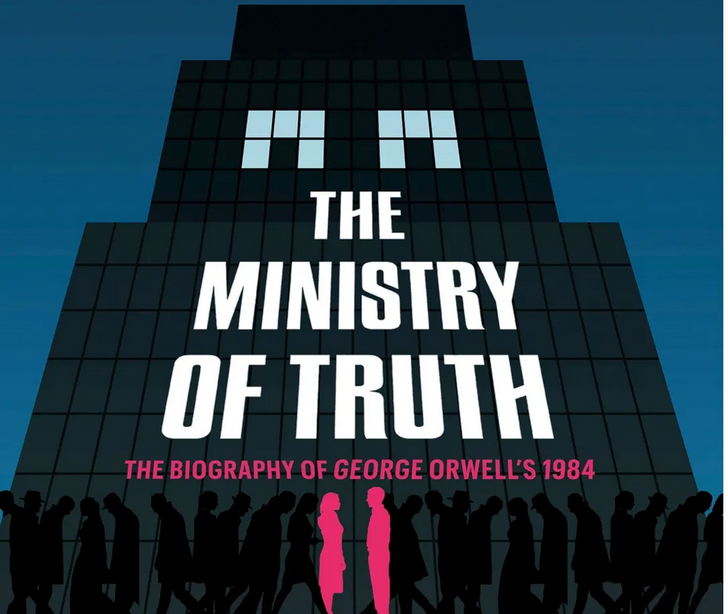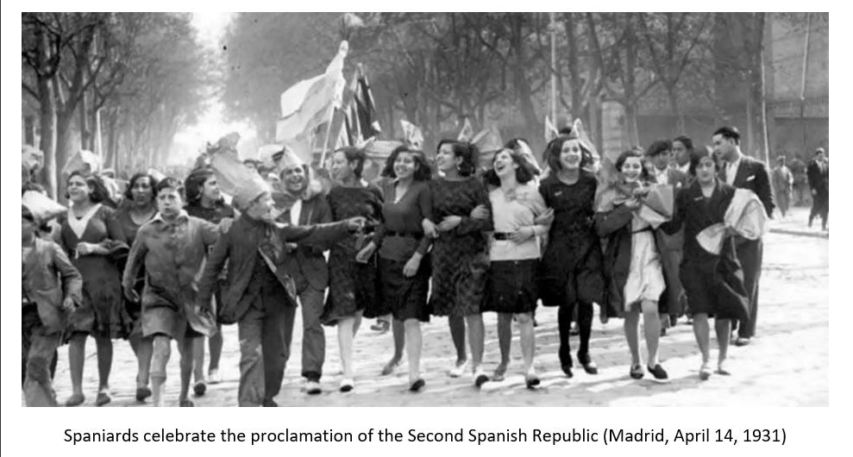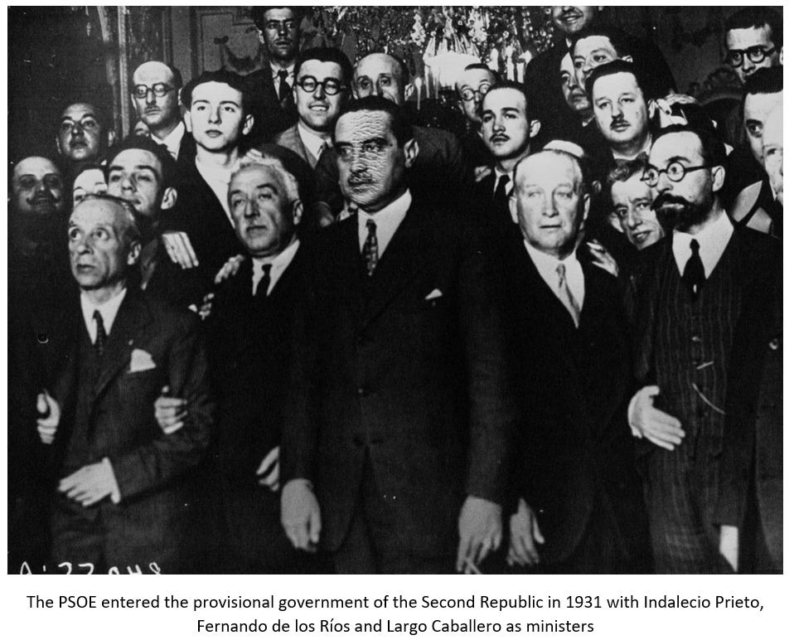Nehru – influenced by the Webbs and other Fabians of course – decided that the way to develop a peasant economy into a rich country was to have strong and centralised control of that economy. This was, of course, purblind and rancid idiocy.
Strong and centralised control is something that only a rich country can afford because only a rich economy can weather the costs – the inefficiencies, the politically directed nonsenses – that such control insists upon.
Of course, rich countries shouldn’t make themselves poorer in this manner either but an already poor place can’t afford to have them – because if it does then people die.
India’s poor because of that attempt at socialist development. Something we can prove by the manner in which development sped up when even some portion of the socialism was dropped. Sure, the Webbs set up the LSE, the place I started to learn my economics but they were responsible for far greater evils than my views as well.
Tim Worstall, “A Sad Lesson About India’s History”, Continental Telegraph, 2020-05-01.
March 8, 2025
QotD: India’s post-independence economic mistake
January 4, 2025
Can Javier Milei Make Argentina Great Again?
Adam Smith Institute
Published 3 Jan 2025In November 2023, Argentina elected Javier Milei, a libertarian economist armed with a chainsaw and a bold plan to rescue the country from decades of decline. Facing 142% inflation, a crumbling peso, and 40% poverty, Milei slashed spending, deregulated markets, and delivered a historic budget surplus — all within a year.
Sam Bidwell dives into Milei’s radical reforms, exploring the challenges that have made them necessary. He traces the country’s rise as a global economic powerhouse in the early 20th century, its decline through years of government intervention and Peronism, and its resurgence under Milei’s leadership.
Discover how this fiery libertarian turned Argentina’s economic fortunes around — and what the world can learn from his audacious blueprint for recovery.
Subscribe for more insights on global economics, history, and leadership!
Check out our website for more economics content: https://www.adamsmith.org/
TIMESTAMPS
00:00 Start
00:53 Golden Years
02:59 Decline of Argentina
05:20 Peron
08:47 The Legacy of Peronism
11:56 After the Falklands
15:38 Javier Milei
18:17 Challenges
24:31 Lesson for the UK and the wider world
October 10, 2024
The Road to Serfdom by F.A. Hayek
David Warren recommends one of the first economics books I ever read and I fully concur with his appreciation of Friedrich Hayek’s most famous work:
For those who have an interest in politics, who also wish to have some knowledge of this subject, I can recommend a book published in 1944. It is by Friedrich Hayek, and is dedicated “To the socialists of all parties”. The title is, The Road to Serfdom.
It is extraordinarily well-written, for an academic whose native language wasn’t English, in less than two hundred exhilarating pages. The book predicts, correctly, that while they will lose the War, German ideological notions that began to prevail before the War in e.g. Germany, Russia, Italy, and throughout the West, would continue to do so, in Britain and America. They were plausible and were thought to have been proved in wartime. In the coming peacetime, all the intellectuals would be on board.
Yet they were wrong, and had always been wrong. The professor, Hayek, shows why neither a little nor a lot of socialism will ever work; why it invariably makes everyone poorer, except for an ideological elite; and why it traps whole societies in the condition of serfdom. Oddly enough, almost no one wants to be a serf, but some wish to have power over serfs. Hence the popularity of socialism among the power-hungry.
Too, ambiguous and poorly understood political terms fool people. (My father explained this as the Triple-B principle: “Bullshit Baffles Brains”.)
The idle reader should still be captivated by this book, which hasn’t dated, even slightly. Re-reading it, as I have been doing since high school, I find the arguments irresistible and compelling. Other members of the “Austrian School” out of which Hayek sprang (it was originally a Catholic movement, incidentally) are also informative, but none are so articulate.
The “Chicago School”, of Milton Friedman et alia, was the nearest American equivalent. But that was based on numbers, more than upon the ironical ideas, which old Austro-Hungaria had the leisure to mull.
September 15, 2024
QotD: “Primordial” Marxism
By “primordial Marxism” I mean Marx’s original theory of immiseration and class warfare. Marx believed, and taught, that increasing exploitation of the proletariat would immiserate it, building up a counterpressure of rage that would bring on socialist revolution in a process as automatic as a steam engine.
Inconveniently, the only place this ever actually happened was in a Communist country – Poland – in 1981. I’m not going to get into the complicated historiography of how the Soviet Revolution itself failed to fit the causal sequence Marx expected; consult any decent history. What’s interesting for our purposes is that capitalism accidentally solved the immiseration problem well before then, by abolishing Marx’s proletariat through rising standards of living – reverse immiseration.
The most forward-thinking Marxists had already figured out this was going to be a problem by around 1910. This began a century-long struggle to find a theoretical basis for socialism decoupled from Marxian class analysis.
Early on, Lenin developed the theory of the revolutionary vanguard. In this telling, the proletariat was incapable of spontaneously respond to immiseration with socialist revolution but needed to be led to it by a vanguard of intellectuals and men of action which would, naturally, take a leading role in crafting the post-revolutionary paradise.
Only a few years later came one of the most virulent discoveries in this quest – Fascism. It is not simplifying much to say that Communists invented Fascism as an escape from the failure of class-warfare theory, then had to both fight their malignant offspring to death and gaslight everyone else into thinking that the second word in “National Socialism” meant anything but what it said.
During its short lifetime, Fascism did exert quite a fascination on the emerging managerial-statist elite. Before WWII much of that elite viewed Mussolini and Hitler as super-managers who Got Things Done, models to be emulated rather than blood-soaked tyrants. But Fascism’s appeal did not long survive its defeat.
Marxists had more success through replacing the Marxian economic class hierarchy with other ontologies of power in which some new victim group could be substituted for the vanished proletariat and plugged into the same drama of immiseration leading to inevitable revolution.
Most importantly, each of these mutations offered the international managerial elite a privileged role as the vanguard of the new revolution – a way to justify its supremacy and its embrace of managerial state socialism. This is how we got the Great Inversion – Marxists in the middle and upper classes, anti-Marxists in the working class being dismissed as gammons and deplorables.
Leaving out some failed experiments, we can distinguish three major categories of substitution. One, “world systems theory”, is no longer of more than historical interest. In this story, the role of the proletariat is taken by oppressed Third-World nations being raped of resources by capitalist oppressors.
Though world systems theory still gets some worship in academia, it succumbed to the inconvenient fact that the areas of the Third World most penetrated by capitalist “exploitation” tended to be those where living standards rose the fastest. The few really serious hellholes left are places (like, e.g. the Congo) where capitalism has been thwarted or co-opted by local bandits. But in general, Frantz Fanon’s wretched of the Earth are now being bourgeoisified as fast as the old proletariat was during and after WWII.
The other two mutations of Marxian vanguard theory were much more successful. One replaced the Marxian class hierarchy with a racialized hierarchy of victim groups. The other simply replaced “the proletariat” with “the environment”.
Eric S. Raymond, “The Great Inversion”, Armed and Dangerous, 2019-12-23.
August 23, 2024
QotD: The decline of the British working class
It’s easy enough to locate [the beginning of the inversion] – World War II. The war effort quickened the pace of innovation and industrialization in ways that are easy to miss the full significance of. In Great Britain, for example, wartime logistical demands – especially the demands of airfields – stimulated a large uptick in road-making. All that infrastructure outlasted the war and enabled a sharp drop in transport costs, with unanticipated consequences like making it inexpensive for hungry (and previously chronically malnourished!) working-class people in cities to buy meat and fresh produce.
Marxists themselves were perhaps the first to notice that the “proletariat” as their theory conceived it was vanishing, assimilated to the petty bourgeoisie by the postwar rise in living standards and the propagation of middlebrow culture through the then-new media of paperback books, radio, and television.
In the new environment, being “working class” became steadily less of a purchasing-power distinction and more one of culture, affiliation, and educational limits on upward mobility. A plumber might make more than an advertising copywriter per hour, but the copywriter could reasonably hope to run his own ad agency – or at least a corporate marketing department – some day. The plumber remained “working class” because, lacking his A-level, he could never hope to join the managerial elite.
At the same time, state socialism was becoming increasingly appealing to the managerial and upper classes because it offered the prospect not of revolution but of a managed economy that would freeze power relationships into a shape they were familiar with and knew how to manipulate. This came to be seen as greatly preferable to the chaotic dynamism of unrestrained free markets – and to upper-SES people who every year feared falling into poverty less but losing relative status more, it really was preferable.
In Great Britain, the formation of the National Health Service in 1947 was therefore not a radical move but a conservative one. It was a triumph not of revolutionary working-class fervor overthrowing elites but of managerial statism cementing elite power in place.
During the long recovery boom after World War II – until the early 1970s – it was possible to avoid noticing that the interests of the managerial elite and the working classes were diverging. Both the U.S. and Great Britain used their unmatched industrial capacity to act as price-takers in international markets, delivering profits fat enough to both buoy up working-class wages and blur the purchasing-power line between the upper-level managerial class and the owners of large capital concentrations almost out of existence.
The largest divergence was that the managerial elite, like capitalists before them, became de-localized and international. What mobility of money had done for the owners of capital by the end of the 19th century, mobility of skills did for the managerial class towards the end of the 20th.
As late as the 1960s, when I had an international childhood because my father was one of the few exceptions, the ability of capital owners to chase low labor costs was limited by the unwillingness of their hired managers to live and work outside their home countries.
The year my family returned to the U.S. for good – 1971 – was about the time the long post-war boom ended. The U.S. and Great Britain, exposed to competition (especially from a re-industrialized Germany and Japan) began a period of relative decline.
But while working-class wage gains were increasingly smothered, the managerial elite actually increased its ability to price-take in international markets after the boom. They became less and less tied to their home countries and communities – more willing and able to offshore not just themselves but working-class jobs as well. As that barrier eroded, the great hollowing out of the British industrial North and the American Rust Belt began.
The working class increasingly found itself trapped in dying towns. Where it wasn’t, credentialism often proved an equally effective barrier to upward mobility. My wife bootstrapped herself out of a hardscrabble working-class background after 1975 to become a partner at a law firm, but the way she did it would be unavailable to anyone outside the 1 in 100 of her peers at or above the IQ required to earn a graduate degree. She didn’t need that IQ to be a lawyer; she needed it to get the sheepskin that said she was allowed to be a lawyer.
The increasingly internationalized managerial-statist tribe traded increasingly in such permissions – both in getting them and in denying them to others. My older readers might be able to remember, just barely, when what medical treatment you could get was between you and your physician and didn’t depend on the gatekeeping of a faceless monitor at an insurance company.
Eventually, processing of those medical-insurance claims was largely outsourced to India. The whole tier of clerical jobs that had once been the least demanding white-collar work came under pressure from outsourcing and automation. effectively disappearing. This made the gap between working-class jobs and the lowest tier of the managerial elite more difficult to cross.
In this and other ways, the internationalized managerial elite grew more and more unlike a working class for which both economic and social life remained stubbornly local. Like every other ruling elite, as that distance increased it developed a correspondingly increasing demand for an ideology that justified that distinction and legitimized its power. And in the post-class-warfare mutations of Marxism, it found one.
Eric S. Raymond, “The Great Inversion”, Armed and Dangerous, 2019-12-23.
July 15, 2024
QotD: Sticking it to “the Man” in Collegetown, USA
Back in College Town, it was as predictable as sunrise: Every election year, a group of Leftie goofs would picket Republican Party headquarters. It was an exercise in futility, of course — since College Town was exactly that, and it totally dominated its surrounding county, no Republican had bothered even making a whistle stop there since the 1950s. A Republican couldn’t get elected dog catcher; the token county headquarters was, no fooling, located in an all-but-abandoned strip mall next to a thrift store.
But it made a certain type of college kid, and of course xzhyr professors, feel good about themselves, sticking it to The Man like that, so they kept on keepin’ on. In the grand tradition of puerile student protest, they’d routinely chalk up the parking lot and sidewalk in front of the building with catchy slogans like “this sidewalk brought to you by socialism!” Yes, they really thought that, and if you’ve followed my “inside the ivory gulag” posts, you can easily suss out why: Sidewalks are public services; public services are paid for by taxes; “conservatives” are against taxes; “conservatives” are also against socialism; therefore sidewalks are socialist.
No, really — I’ve heard more than one professor make a version of that “argument”. If it’s a public service of any kind — police, trash pickup, whatever — it’s by definition “socialist”, because it’s paid for by taxes, and “conservatives” think all taxes, everywhere, are totally illegitimate.
College these days runs about $20K per year on average, by the way. What a deal, huh?
Severian, “Caveat Emptor”, Rotten Chestnuts, 2021-06-16.
June 21, 2024
Fractal dissidence
Fortissax notes some historic parallels between the many, many factions in Spain leading up to the catastrophe of the Spanish Civil War and the many, many factions of the dissident right in the Anglosphere and the rest of the diminishing western world today:
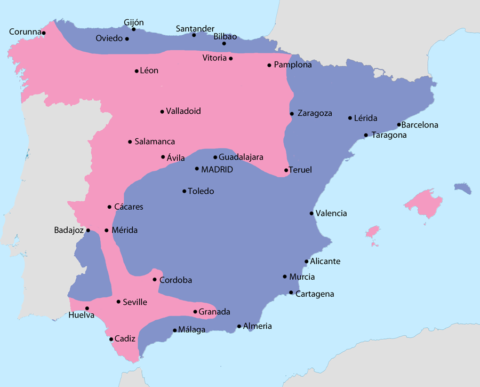
The Spanish Civil War, approximate Nationalist (pink) and Republican (blue) areas of control in September, 1936.
Map by NordNordWest with modifications by “Sting” via Wikimedia Commons.
We have serious issues on our hands. We must each contribute through our respective projects and instigate real-world change by pen, sword, or ploughshare. We don’t have time to split, fracture, insult, belittle, destroy each other’s reputations, or engage in character assassination. I liken the factionalism of the (terminally) online right to that of the factions in the Spanish Civil War. The online right is important because the internet is the new “public square”. As influential or more, as mass-action in living, breathing cities. The influence of discourse, media, and content on the internet is insurmountable. While small locally, the impact of each content maker, producer, writer, poet, and videographer is huge. We are part of a civilizational, some would even say global, culture, yet not of it. I will provide examples of some similarities I notice while reading through Peter Kemp’s “Mine Were of Trouble”.
In the buildup to the Spanish Civil War, you had conservative patriots (populists, anti-woke patriot-normies), traditionalist Christian monarchists (who parallel Christ-Is-King people), and the Falangist (who parallel the Vitalists, secular-right). This roughly, parallels the groupings of the Dissident Right today. I believe this is a good case study. History may not repeat itself, but it rhymes. All of them had a lot more in common than they opposed. For example, consider the following points:
- Anti-Communism: Both the Falangists and the Requetés were strongly anti-communist and opposed the Spanish Republic, which they associated with communism, liberalism, and anarchism. They viewed the leftist factions as threats to Spanish traditions, religion, and social order. Today, the Managerial Elite of every single western country has weaponized the New-Left of decades past to use as shock troops against the good people of each nation. We all agree the mass psychosis of capital backed DEI civic cult, their nihilistic, suicidal anti-life acolytes are the most destructive group the human species has ever seen.
- Support for Strong Leaders: Both groups eventually supported General Francisco Franco’s leadership, despite some initial differences in ideology and goals. Franco’s ability to unify the Nationalist forces was crucial to their eventual victory. In many Western countries today, people are rallying behind Trump, Bardella, Farage, Bernier to name a few. They are not perfect, but they are increasingly influenced by Dissident Right ideas, and culture.
- Nationalism: The Falangists and the Requetés were deeply nationalist, believing in the unity and greatness of Spain. They were committed to preserving Spain as a single, undivided nation-state. Today, Dissidents of all stripes support nationalism an civilizational cooperation against outside threats like China, the emerging Republic of India, and the Islamic world, who seek to make excursions in Europe.
- Militarism: Both factions believed in the application of force when necessary to achieve their goals and restore order in Spain. They were heavily involved in the Nationalist military efforts during the civil war. Both the religious right, and the secular Vitalists ostensibly believe a strong body, mind and soul are necessary to enact change. Both hold excellence as a core value, although perhaps one more than the other.
- Benevolent Authoritarianism: Both the Falangists and the Requetés supported authoritarian forms of government. While the Falangists leaned towards a Nietzsche inspired model, the Requetés, rooted in traditional Christian monarchism, were also supportive of strong, centralized authority to maintain order and uphold traditional values.
- Natural Social Order: Both groups believed in a natural social order or organic hierarchy. This concept held that society should be structured according to natural, hierarchical lines, which they saw as inherent and beneficial for maintaining stability and harmony. Do the religious right, and the Vitalists not believe this? That the strong, the beautiful, healthy, are fit to lead? That the most capable should be given the opportunity to advance socially?
- Community Over Individual: While recognizing and respecting the Western man’s innate streak of liberty and individualism, both groups prioritized the needs and values of the community over the individual. They believed that individuals found their true purpose and identity within the larger community and that communal values should guide social and political life. When everyone is doing their part, all prosper.
June 16, 2024
Orwell’s Nineteen Eighty-Four at 75
Ed West on the attempts by many different parties to claim the legacy of George Orwell for their own purposes:
No writer’s legacy and approval is so fought over as George Orwell, whose final — and most celebrated — work Nineteen-Eighty-Four was published seventy five years ago this month.
The most influential piece of political fiction in history, such is the success of the dystopian novel that its themes have been recited to death by columnists, often by people I imagine he would have loathed (including me).
Orwell’s nightmare became a particular focus of conservative commentators from the 1990s with the rise of “political correctness”, which might be seen as both a form of politeness and at the same time a way of policing opinions by changing the language. As Orwell’s Newspeak was described, it was to ensure that dissent cannot be voiced because “the necessary words were not available”. Newspeak, along with thought police and doublethink, has become a part of our political vocabulary, while even the proles have Big Brother to entertain them. No one can doubt that Orwell has won the final victory, and the struggle for the writer’s soul forms part of Dorian Lynskey’s entertaining and informative The Ministry of Truth, a biography of Nineteen-Eighty-Four which was published at the time of the last significant anniversary.
Lynskey, a hugely gifted writer who specialises in the relationship between arts and politics, is very much on the Left and sees the modern parallels with the Trumpian disdain for truth, although the great man himself is now often more cited by the Right. Indeed the anniversary was recently celebrated by the free-market think-tank the Institute of Economic Affairs with a new edition and an introduction by my friend Christopher Snowdon.
Orwell was a paradoxical man, contradictory, sometimes hypocritical (aren’t we all?). In the preface to his book, publisher Victor Gollancz wrote that “The truth is that he is at one and the same time an extreme intellectual and a violent anti-intellectual. Similarly he is a frightful snob – still (he must forgive me for saying this), and a genuine hater of every form of snobbery.”
As Lynskey writes: “Until the end of his life, Orwell acknowledged that microbes of everything he criticised existed in himself. In fact, it was this awareness of his own flaws that inoculated him against utopian delusions of human perfectibility.”
Such awareness is surprisingly rare among intelligent journalists and commentators, especially when ideology takes a grip — and Orwell was introduced to this reality in quite brutal form.
The background to both Nineteen Eighty-Four and Animal Farm was Orwell’s disillusionment during the Spanish Civil War. The conflict between Nationalists and Republican galvanised western intellectuals and marked the turning point when the intelligentsia became firmly wedded to the Left. Over a thousand writers went to fight in Spain, and while few entirely understood the political situation they did grasp, as Malcolm Muggeridge said, that “it seemed certain that in Spain Good and Evil were at last joined in bloody combat”.
In reality it was a conflict in which both sides committed appalling atrocities, although Franco’s forces certainly outdid their enemies in murderous scale. That ruthlessness partly explains their victory, but the Republicans were not helped by the seemingly endless factionalism that saw various squabbling leftist acronyms fight each other, and which makes the war hard to follow. There was the socialist UGT, the Russian-backed PSUC, the anarchist FAI and anarcho-syndicalist CNT, and also the POUM, Workers’ Party of Marxist Unification, which rather belied its name by falling out with both Stalin and Trotsky.
Spain was an education for Orwell. Witnessing in Barcelona a Russian known only as “Charlie Chan”, allegedly an agent of NKVD, he wrote: “I watched him with some interest for it was the first time I had seen a person whose profession was telling lies — unless one counts journalists”.
He recorded how, with the honourable exception of the Manchester Guardian, “One of the dreariest effects of this has been to teach me that the Left-wing press is every bit as spurious and dishonest as that of the Right”. Welcome to the Intellectual Dark Web, George Orwell.
May 17, 2024
QotD: Canadian socialism
Canada is being destroyed by a form of socialism, but it is not called socialism. Even the NDP shy away from the s-word, and did so long before the fall of the Berlin Wall. How do you fight an idea, or even examine it, when there is a tacit social convention not to speak about it. Forget the Victorian morality brigades fainting at the mention of sex or women’s suffrage. Our modern moralists, who, in this country, are mostly on the left, will not let you use the s-word when talking about issues of public policy. To do so is to be an extremist. A sin at least as bad as immodesty a century ago.
We are a nation of muddlers. Until we grow out of that I’m afraid the words “American-style” and “ideologically driven” will continue to frighten us away from seriously debating issues of public policy.
“Depart, I say, and let us have done with you. In the name of God, go!”, Gods of the Copybook Headings, 2005-05-14.
May 16, 2024
The Thüringen Project – “where our greatest legal minds are at this very moment brainstorming ways to defend Thuringian democracy from the grave threat of ordinary people expressing their political preferences via voting”
eugyppius on the brave defenders of German democracy in Thuringia (and Brandenburg and Saxony) who are doing everything they can to ensure that the unwashed masses don’t disturb the stately progress toward their long-dreamed-of utopia:
To live in Germany in 2024 is to be lectured constantly about democracy. An endless parade of doubtful personalities – pundits, experts and a lot of very shrill women – appear on the television every night to tell you which parties are democratic, which people are democratic and therefore who enjoys democratic legitimacy. As we have seen, however, the whole concept of democracy is very confusing. Those people and organisations who want to mute free expression and ban political parties are all held to be extremely democratic, while those parties that demand more direct democracy and talk constantly about respecting the popular will are the direct modern equivalent of illiberal antidemocratic fascists.
To make all of this even harder, we are told that the upcoming September elections in Thüringen, Brandenburg and Saxony present a grave threat to democracy. To counteract this threat we have things like the Thüringen Project, where our greatest legal minds are at this very moment brainstorming ways to defend Thuringian democracy from the political preferences of actual voters. Crucially, the very existence of the Thüringen Project means that democracy must still reign supreme in Thüringen. Otherwise, there would be nothing for the democratic police of the Thüringen Project to defend. We therefore need only study Thuringian politics in their present state to gain a better idea of what this mysterious, shape-shifting, elusive phenomenon we call German democracy might be.
We will start at the top. The current Minister President (i.e., governor) of Thüringen is a highly democratic man named Bodo Ramelow:
Ramelow is a member of Die Linke, or the Left Party, which is the direct successor of the Socialist Unity Party (or SED) that used to govern the DDR. That might seem baffling, as the SED and the DDR were anything but democratic. Still more baffling is the fact that the constitutional protectors suspected Ramelow of antidemocratic tendencies and even surveilled him for many years. But democracy as we have learned is extremely complicated, and whatever antidemocratic essence Ramelow may have harboured in the past, he is a stalwart democratic politician today. He is also a huge fan of the mobile game Candy Crush, which he enjoys playing during government meetings. That at least seems unambiguously democratic, and perhaps it is even enough to overcome Ramelow’s political unreliability in other respects.
[…]
In summary: A constitutional protector who owes his office to a Minister President who was appointed to a second term via the anti-constitutional interventions of outsiders is now vowing to use his office to forestall political developments that may deprive his Minister President of power in the future. It is almost like “democracy” in Thüringen is synonymous with left-wing government. Elections which threaten to deprive Bodo Ramelow of office or his left-wing coalition of power are by definition anti-democratic, deplorable and perhaps even illegal.
Thuringians can vote for whichever party they want, but their votes are only democratic if they are cast for those specific parties. If Kramer has his way, Thuringia will soon achieve the democratic end-state – one in which the sad reality of popular sovereignty in practice will be replaced with a theoretical popular sovereignty that exists entirely in an ideal, Platonic form, unchanging and as it ought to be, now and forever.
February 4, 2024
Civil strife in Spain before the full civil war broke out
Niccolo Soldo continues his in-depth look at the situation in Spain leading up to the outbreak of the civil war in 1936. It’s clear that bloodshed was in the immediate future — so much so that it’s almost surprising that it took as long as it did for the war to start in earnest:
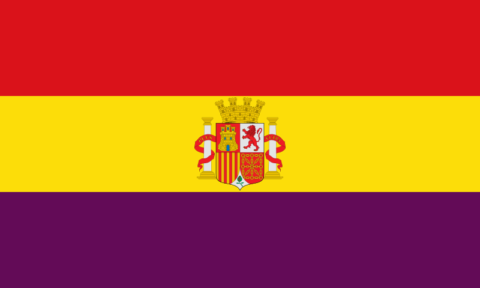
Flag of Spain during the Second Spanish Republic (1931-1939).
Image by SanchoPanzaXXI via Wikimedia Commons.
In 1930, almost half of all Spaniards over the age of 10 were illiterate. The country was still overwhelmingly agrarian, with a small number of very wealthy landowners owning about 2/3rds of all the arable land in Andalusia alone, employing almost a million landless campesinos at barely subsistence-level wages. Industry was almost entirely found only in the north and northeast. Industrialization was beginning to pick up pace by the turn of the century, but was still very far behind the rest of Western Europe by the time the Second Spanish Republic came into being in 1931.
Despite Spain having one foot in the past, its other foot was in the present, a present that was rapidly changing and very unstable politically. The loss of confidence in King Alfonso XIII on the part of the middle and upper classes led to his abdication which opened the door to the establishment of the Second Republic, a democracy in a time when democracy itself was under attack throughout Europe, having already lost in Russia and Italy, and on its way to disappearing in other countries, most notably Germany.
The end of the monarchy was celebrated throughout the country (with some exceptions), but not always for the same reason. Yes, anti-monarchist forces viewed the monarchy as retrograde and out of step with the modern era, but only the liberals and various republican parties were committed to democracy and parliamentary politics. The Socialists (PSOE) for example, were riven by factionalism and a generational divide whereby there were those who sought to use power in office to both settle scores with their old enemies in the military, the landowning class, and especially the Catholic Church, and to actually launch a revolution along Marxist lines. For them, the Second Republic was a vehicle for a larger goal, and not an end goal in and of itself. Anarchists celebrated the end of the monarchy, but they were opposed to any and all government on principle. For Anarchists, the Second Republic was also a path towards revolution as well. For Catalan separatists, the Spanish Second Republic was a stepping-stone towards independence, or at least towards as much political and economic autonomy as possible.
Conservatives were in a state of disarray upon the establishment of the Second Republic. Despite this condition, all the factions that could be grouped as “conservatives” largely supported the new regime … at least at the outset. Once the agenda of the first government of the Second Republic was made public, opposition began to harden.
Rather than trying to generate a grand consensus among the various factions that dominated Spanish politics, economics, and society in 1931, the liberals, republicans, and socialists who led the country from 1931-33 instead chose to attack the core interests of their political rivals to the right. The military was to be slashed via the retirement of a large number of its officer class, land was to be seized from wealthy landowners in order to redistribute it to the poor and landless, and the Catholic Church was to be stripped of its role in educating young Spaniards, with the Jesuits expelled from the country altogether, and many churches, convents, monasteries, episcopal residences, parish houses, seminaries, etc. expropriated by the Spanish state. Private Catholic schools were also expropriated and turned into government-run ones instead. The Church was also forced to pay taxes and was banned from all industry and trade, “… enforced with strict police severity and widespread mob violence”.
These attacks on the Catholic Church (which also saw the torching of churches, monasteries, and convents in 1931 as we saw in the previous entry in this series) resulted in the release of a Papal Encyclical by Pope Pius XI on June 5, 1933 entitled “Dilectissima Nobis“. In this encyclical, Pius XI decries the persecution of the Church in Spain, and asks Spanish Catholics to defend themselves and the Church from attacks by the government. He describes the attacks as “… [an] offense not only to Religion and the Church, but also to those declared principles of civil liberty on which the new Spanish regime declares it bases itself”. As we already saw previously, then-Minister of War in the Spanish cabinet, Manuel Azaña, famously declared that “All the convents in Spain are not worth a single Republican life“.
There was no attempt to build a solid democratic foundation for the Second Republic whatsoever. Instead, a cultural revolution was quickly ushered in, and an agrarian revolution was threatened, but only implemented half-heartedly. The first government of the Second Spanish Republic managed to alienate the military, the landowning class, conservatives, and the Catholic Church overnight.
On the other side of the political divide, the centrists were attacked from the left for not going far enough, fast enough. Campesinos and small landowners demanded immediate expropriation of latifundia estates to be redistributed to them. The youth wing of the PSOE urged the nationalization of all industry, which led to factionalism within the socialist groupings. Less radical socialists pointed to the extension of voting rights to women, to the enshrining of the eight hour workday in law, and to the increase in wages for industry workers as the biggest successes of the first two years of the Second Republic. These radical factions were not content with these incremental gains, and demanded “more, now!”
This radicalism culminated in the “Casas Viejas Incident”, which I described in the previous entry:
Staying true to form, the anarchists were restless and, as is their nature, opposed the present government in Spain as they opposed all governments, viewing them as inherently oppressive. Their massive labour union, CNT, led by the vanguard of FAI, began demonstrations in various locations across the country, with the greatest actions taking place in Andalusia. Political violence ensued, with two Civil Guards wounded. The Assault Guards, set up by the new Constitutional authorities in the Republic to provide a new force to purportedly protect those who lacked protection under the Monarchy, raided the village of Casas Viejas near Cadiz. They encountered a group of anarchists locked in a house and set fire to it (while disarming others in the village who were armed), and then executed them.
This act of state violence was committed not by fascists, nationalists, royalists, or even conservatives. It was committed by a liberal-socialist regime and its purposely-created security force, against anarchists. All the parties involved in this incident would find themselves on the same side in the not-too-distant Spanish Civil War.
January 26, 2024
Javier Milei to the parasites in Davos – You are the problem
Jon Miltimore on Argentine President Javier Milei’s visit to the World Economic Forum in Davos earlier this month:

Argentine President Javier Milei speaking at the World Economic Forum gabfest in Davos, Switzerland, January 2024.
Photo by Flickr – World Economic Forum | CC BY-NC-SA 2.0
Javier Milei went to Davos to attend the 54th annual World Economic Forum (WEF) meeting last week.
Attendees of the meetings — often derided as global elites who bask in their pomp, privilege, and luxury as they try to address global problems with collectivist solutions — received a jarring message from Argentina’s newly-elected president: you are the problem.
“Today I’m here to tell you that the Western world is in danger,” Milei said in his prepared remarks. “And it is in danger because those who are supposed to have to defend the values of the West are co-opted by a vision of the world that inexorably leads to socialism, and thereby to poverty.”
[…]
This is just a sprinkling of the topics discussed in Davos, of course, but you’ll notice a common current that runs throughout them: the solution to virtually every problem requires more government and “collective action”, and less freedom.
This is precisely the kind of thinking Milei, a self-described libertarian, took aim at in his speech, which was a clarion call for leaders to reject collectivist thinking and embrace individual freedom.
“The main leaders of the Western world have abandoned the model of freedom for different versions of what we call collectivism,” Milei told the audience. “We’re here to tell you that collectivist experiments are never the solution to the problems that afflict the citizens of the world; rather they are the root cause.”
As Milei pointed out, few can better attest to the failures of collectivism than Argentines. The country surged to prosperity in the latter half of the nineteenth century, only to experience a massive drop in prosperity due to its embrace of Peronism, a blend of fascism and socialism named after the left-leaning revolutionary Juan Domingo Perón (1895–1974) who dominated Argentine politics for decades following his initial ascent to power in 1946.
While many of Milei’s predecessors, such as the jet-setting Cristina Fernández de Kirchner, a self-described Peronist and progressive, were delivering international speeches in Copenhagen about tackling climate change through “a new multilateralism”, Argentines watched their country slowly collapse into poverty.
By embracing protectionist trade policies and rampant government spending, Peronists set Argentina’s economy on fire. By 2023, 40 percent of the population was in poverty and inflation had reached more than 140 percent due to massive money printing. Because of the constantly eroding value of pesos, Argentine merchants are compelled to update prices on chalkboards throughout the day.
The human disaster in Argentina was not caused by climate change or AI or “misinformation”.
It was caused by Argentine politicians and bureaucrats abandoning free-market capitalism, an economic system that brought about unprecedented human prosperity across the globe, and a stark contrast to its various collectivist counterparts — fascism, Peronism, communism, anti-capitalism, etc.
This is why Mr. Milei called capitalism the only “morally desirable” economic system, and the only one that can alleviate global poverty.
December 9, 2023
Venezuela’s renewed imperialism
Like many of us, Colby Cosh is trying to figure out what’s going on in Venezuela these days, as the government “won” a plebiscite to push its long-standing claim for a huge chunk of next-door neighbour Guyana’s territory:
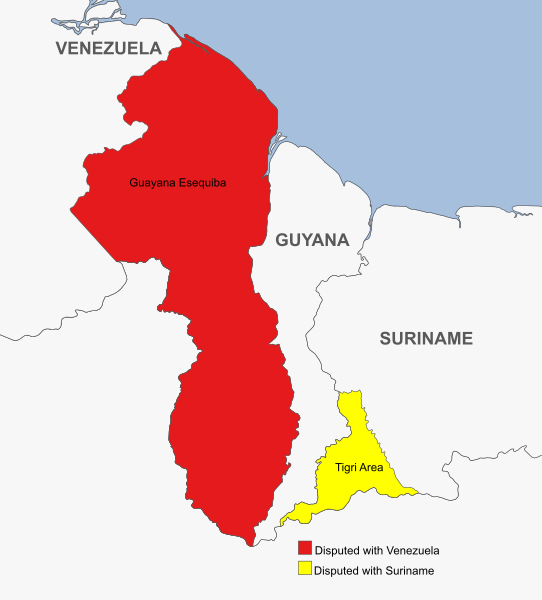
Map showing the two disputed land areas of Guyana. The red region is disputed with Venezuela (Guayana Esequiba) and the yellow region is disputed with Suriname (Tigri or New River Triangle)
Map by SurinameCentral via Wikimedia Commons.
I’ve been plunging into the weeds — as some of my readers perhaps are — trying to figure out why Venezuela is trying to take over three-quarters of the land area of neighbouring Guyana. I mean, yes, duh, the simple answer is “oil”. The relevant part of Guyana — the sparsely populated, heavily Indigenous Essequibo region west of the river of the same name — has been claimed by Venezuela with varying degrees of vigour and indignation since it became independent from Spain. In the last decade or so, it has come to light there is abundant oil beneath the continental shelf belonging to the Essequibo area.
It might, in fact, be enough oil to make Guyana the world’s largest crude producer in a manner of months. Such an event would almost certainly create an unbearable crisis for the radical-left Venezuelan government, which has fouled up its own oil industry, obliterated its currency and created the single largest refugee crisis in the recorded history of the Americas. And so, the North Korea of the Western Hemisphere is suddenly behaving in an awfully warlike — one might say imperialistic — manner towards a tiny neighbour. Which is, in turn, why the United States is rattling the sabre in Guyana’s defence.
The basic situation in the Essequibo region in the centuries after Columbus was that the territory de jure belonged to Spain but was often really in the hands of Dutch mariners and colonists. There was a long cycle of Dutch incursion and Spanish retaliation. Venezuela inherited and pursued the Spanish claims upon independence — originally as part of the Republic of Gran Colombia (1811) and then as a sovereign state unto itself (1830). Britain gained the Dutch territory in the Napoleonic Wars and incorporated Essequibo into the unified colony of British Guiana in 1831.
The two countries recognized that they had a big disagreement over where the Venezuela-British Guiana border might actually lie. But Venezuela wasn’t in a position to pick a fight with the British Empire, and British public opinion couldn’t be convinced to care very much about the problem. The two countries kicked the can down the road and mutually agreed not to colonize the area.
Fast-forward a bit: in the 1870s, gold was discovered in the disputed zone, waaay over toward the Venezuelan side, and in the 19th century, gold meant a gold rush. British and American privateers started turning up with shovels and pickaxes in the interior, sovereignty be damned. Venezuela eventually began to lobby the U.S. executive branch for redress, reminding American politicians of their precious Monroe Doctrine (which was technically incompatible with the existence of a “British Guiana”). Britain, coming under uncomfortable diplomatic pressure, agreed to submit the border question to neutral arbitration.
And here we come to the heart of the quarrel. The U.S. and Britain set up an arbitration panel of the classic 19th-century kind — the same kind of panel, in fact, that fixed up much of the U.S.-Canada border during the same period. This panel had two American Supreme Court justices representing Venezuelan interests; two equally high-ranking British judges; and a neutral fifth man borrowed from the Russian Empire — the Estonian international-law scholar Friedrich Martens (1845-1909). Throughout the 19th century, Russia had often been used in this way by western powers as an honest broker, and arbitration was seen as a universal means of peaceful dispute resolution — the great hope of the world’s future.
And yet, like what seems to be every border dispute in South America since the Spanish skedaddled, an agreement doesn’t seem to last more than the lifetime of one of the governments that negotiated it and some of them aren’t even that durable. Ed Nash has a video summarizing the economic and military state of affairs that helps explain why this dispute is potentially of global concern.
November 5, 2023
Hugo Chávez
The most recent entry in the Dictator Book Club at Astral Codex Ten looks at former Venezuelan President Hugo Chávez:
All dictators get their start by discovering some loophole in the democratic process. Xi realized that control of corruption investigations let him imprison anyone he wanted. Erdogan realized that EU accession talks provided the perfect cover to retool Turkish institutions in his own image.
Hugo Chavez realized that there’s no technical limit on how often you can invoke the emergency broadcast system. You can do it every day! The “emergency” can be that you had a cool new thought about the true meaning of socialism. Or that you’re opening a new hospital and it makes a good photo op. Or that opposition media is saying something mean about you, and you’d like to prevent anyone from watching that particular channel (which is conveniently bound by law to air emergency broadcasts whenever they occur).
This might not be the only reason or even the main reason Hugo Chavez ended up as dictator. But it’s a very representative reason. If Putin is basically a spook and Modi is basically an ascetic, Hugo Chavez was basically a showman. He could keep everyone’s attention on him all the time (the emergency broadcast system didn’t hurt). And once their attention was on him, he could delight them, enrage them, or at least keep them engaged. And he never stopped. Hugo Chavez was the marathon runner of dictators.
He was on television almost every day for hours at a time, invariably live, with no script or teleprompter, mulling, musing, deciding, ordering. His word was de facto law, and he specialised in unpredictable announcements: nationalisations, referenda, troop mobilizations, cabinet shuffles. You watched not just for news value. The man was a consummate performer. He would sing, dance, rap; ride a horse, a tank, a bicycle; aim a rifle, cradle a child, scowl, blow kisses; act the fool, the statesman, the patriarch. There was a freewheeling, improvised air to it all. Suspense came from not knowing what would happen.
There would be no warning. Soap operas, films, and baseball games would dissolve and be replaced by the familiar face seated behind a desk or maybe the wheel of a tractor … it could [last] minutes or hours. Sometimes Chavez wouldn’t be talking, merely attending a ceremony … One time Chavez decided to personally operate a machine on the Caracas-to-Charallave rail tunnel. A television and radio announcer improvised commentary for the first few minutes, but gradually ran out of things to say as the president continued drilling, drilling, drilling. Radio listeners, blind to Chavez pounding away, were baffled and then alarmed by the mechanical roar monopolizing the airwaves. Some thought it signaled a coup.
In 2012, while he was dying of cancer, Chavez gave “a state of the nation address lasting nine and a half hours. A record. No break, no pause.” Put a TV camera in front of him, and the man was a machine.
If he had been an ordinary celebrity, he would be remembered as a legend. But he went too far. He became his TV show. He optimized national policy for ratings. The book goes into detail on one broadcast in particular, where he was filmed walking down Venezuela’s central square, talking to friends. He remarked on how the square needed more monuments to glorious heroes. But where could he put them? The camera shifted to a mall selling luxury goods. A lightbulb went on over the dictator’s head: they could expropriate the property of the rich capitalist elites who owned the mall, and build the monument there. Make it so! Had this been planned, or was it really a momentary whim? Nobody knew.
Then he would move on to some other topic. An ordinary citizen would call in and describe a problem. Chavez would be outraged, and immediately declare a law which solved that problem in the most extreme possible way. Was this staged? Was it a law he had been considering anyway? Again, hard to tell.
Sometimes everyone in government would ignore his decisions to see if he forgot about them. Sometimes he did. Other times he didn’t, and would demand they be implemented immediately. Nobody ever had a followup plan. They expropriated the mall, but Chavez’s train of thought had already moved on, and nobody had budgeted for the glorious monuments he had promised. The mall sat empty; it became a dilapidated eyesore. Laws declared on the spur of the moment to sound maximally sympathetic to one person’s specific problem do not, when combined into a legal system, form a great basis for governing a country.
But Chavez TV was also a game show. The contestants were government ministers. The prize was not getting fired. Offenses included speaking out against Chavez:
Chavez clashed with and fired all his ministers at one time or another but forgave and reinstated his favorites. Nine finance ministers fell in succession … it was palace custom not to give reasons for axing. Chavez, or his private secretary, would phone the marked one to say thank you but your services are no longer required. Good-bye. The victim was left guessing. Did someone whisper to the comandante? Who? Richard Canan, a young, rising commerce minister, was fired after telling an internal party meeting that the government was not building enough houses. Ramon Carrizales was fired as vice president after privately complaining about Cuban influence. Whatever the cause, once the axe fell, expulsion was immediate. The shock was disorienting. Ministers who used to bark commands and barge through doors seemed to physically shrink after being ousted … they haunted former colleagues at their homes, seeking advice and solace, petitioning for a way back to the palace. “Amigo, can you have a word with the chief?” One minister, one of Chavez’s favorites, laughed when he recounted this pitiful lobbying. “They know it as well as I do. In [this government] there are no amigos.”
… or taking any independent action:
[A minister] was not supposed to suggest an initiative, solve a problem, announce good news, theorise about the revolution, or express an original opinion. These were tasks for the comandante. His fickleness encouraged ministers to defer implementation until they were certain of his wishes. In any case they spent so much time on stages applauding — it was unwise to skip protocol events — that there was little opportunity for initiative. Thus the oil minister Rafael Ramirez would lurk, barely visible, while the comandante signed a lucrative deal with Chevron […]
But upon command, the stone would transform into a whirling dervish … the comandante‘s impulsiveness demanded instant, urgent responses. He would become consumed by a theme. Rice! Increase rice production! The order would ricochet through [the government]. The agriculture, planning, transport, commerce, finance, and infrastructure ministers would work around the clock devising a scheme or credits, loans, cooperatives, mills and trucks to have it ready, at least on paper, for the comandante to unveil on his Sunday show. Thus was born the Mixed Company for Socialist Rice. Then, the next week, chicken! Cheaper chicken! The same ministers would forget about rice while they rushed to squeeze farmers, truckers, and supermarkets so that the comandante could say, on his next show, that chicken was cheaper.
… or, worst of all, not enjoying Chavez’s TV shows enough:
[Ministers had to] arrange their features into appropriate expressions when on camera or in the comandante‘s sight line. This was tricky when the comandante did something foolish or bizarre because the required response could contradict instinct … Missing a cue could be fatal. During a show the comandante‘s laser-beam gaze swung from face to face, spotlighting expressions, seeking telltale tics. Immediately after a broadcast, Chavez reviewed the footage, casting a professional eye over the staging, lighting, camera angles — and audience reaction.
The comandante‘s occasional lapses into ridiculous were inevitable. He spoke up to nine hours at a time live on television, without a script … Being capricious and clownish also sustained interest in the show and underlined his authority. No other government figure, after all, dared show humour in public. But on occasion this dissolved into absurdity. Who tells a king he is being a fool?
Ministers faced another test of the mask in September 2007, when the comandante announced clocks would go back half an hour. The aim was to let children and workers wake up in daylight, he said. “I don’t care if they call me crazy, the new time will go ahead, let them call me whatever they want. I’m not to blame. I received a recommendation and said I liked the idea.” Chavez wanted it implemented within a week — causing needless chaos — and bungled the explanation, saying clocks should go forward rather than back. If ministers realized the mistake, they said nothing, only smiled and clapped […]
On rare occasions the correct response was not obvious, sowing panic. In a speech to mark World Water Day in 2011, the comandante said capitalism may have killed life on Mars. “I have always said, heard, that it would not be strange that there had been civilisation on Mars, but maybe capitalism arrived there, imperialism arrived and finished off the planet.” Some in the audience tittered, assuming it was a joke, then froze when they saw neighbors turned to stone. To these audience veterans it was unclear if it was a joke, so they adopted poker faces, pending clarification. It never came; the comandante moved on to other topics.
How did a once-great nation reach this point? I read Rory Carroll’s Comandante to find out.
September 5, 2023
QotD: “Karl Marx was right after all”
Alas, as my fictional namesake said somewhere, time has a habit of turning all our lies into truths. It turns out Karl Marx was right after all. Who, I ask you, is more cartoonishly evil, more like the caricature capitalist of paranoid Communist fantasies, than Jeff Bezos? Mark Zuckerberg? Tim Cook? Jack Dorsey? Sundar Pichai?
We’re actually living, comrades, in the class-warfare world Marx preached in the 1840s. Everything Marx said about the factory owners of the First Industrial Revolution, that seemed so luridly absurd that even other Socialists criticized him for it, is true of the tech fascists of the Biden-Harris Revolution. Solzhenitsyn cites Russian writers from the late nineteenth century noting that Marxian socialism would end up as nothing more than dialectically-constructed feudalism, and lo, here we are. America in 2021 looks almost exactly like the USSR looked upon Lenin’s death …
… that was 1924, gang, and in case you’ve forgotten, what happened next was a vicious intra-Party civil war, in which Stalin crushed his enemies. AOC makes a pretty unlikely Trotsky, but it’s no less ludicrous than the thought of Nancy Pelosi as Koba … but that’s just the thing, isn’t it? We’ve been noting here for years that the modern Left is dedicated to being the Hollow Men in all things. They’re Revolutionaries without a Revolution — they go on and on (and on and on and on) about fighting the power and sticking it to the Man, even though they, themselves, have been the Man since at least 1974. They’re moralizers without morality — you’ll be scolded for not being as perverse as humanly possible. And, of course, their politics is a cult of personality without the personality — not even Orwell or Kafka could’ve come up with the Party installing an obvious dementia patient as its figurehead, not even if you’d dropped LSD in their tea.
As always — and yes, even in the depths of Stalin’s terror — the real rulers are the nomenklatura, the apparatchiki. Not even Koba the Dread can be everywhere. Being Hollow Men, our Postmodern Leftist masters have decided to dispense with the whole Kremlin thing. Who needs the NKVD, the gulag, the dreaded Lubyanka? The Junior Volunteer Thought Police “fact checking” everything on social media will do it for free, and much more efficiently, at which point their fellow travelers in the banking system will simply cut the badthinkers off. The only reason the gulag persisted after Khrushchev’s “secret speech” was that the Soviets, those fools, wanted to exploit their natural resources themselves, to build things themselves; labor camps were thus integral to the Soviet economy. Our masters don’t care about that, and their masters, the Chinese, certainly don’t. Much more efficient, and psychologically effective, to let the unperson simply starve in the middle of the town square, pour encourager les autres.
But hey, at least we’ll have some fun figuring out who the new Trotsky is. Again, my money’s on AOC — she’s so stupid that she’s bound to do something irrecoverably dumb sooner or later, after which she gets the digital icepick. That’ll be a hoot. Enjoy what parts of the spectacle you can, comrades – if you’re a student of human folly, you’re going to love the next few decades, because Marx was right about that too, the bastard — second time as farce.
Severian, “Marx Was Right After All (on ongoing series”, Rotten Chestnuts, 2021-01-12.



